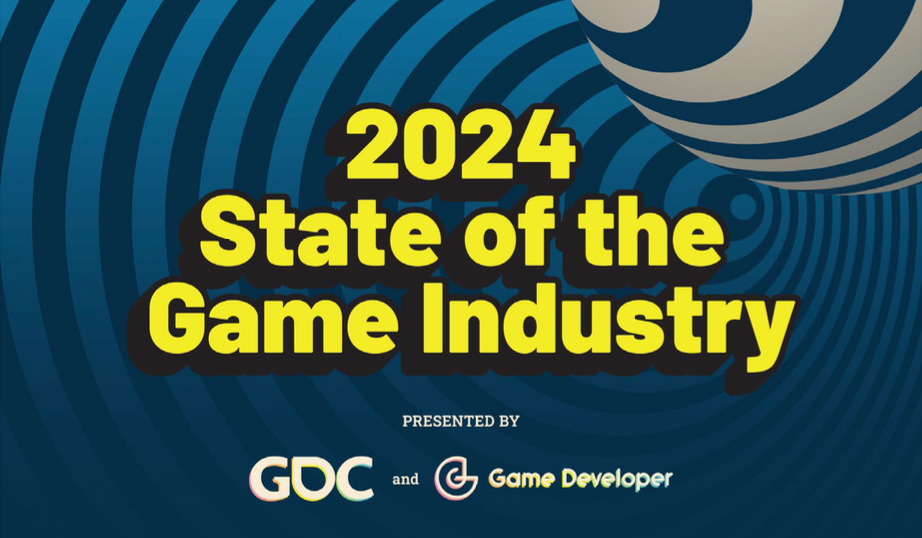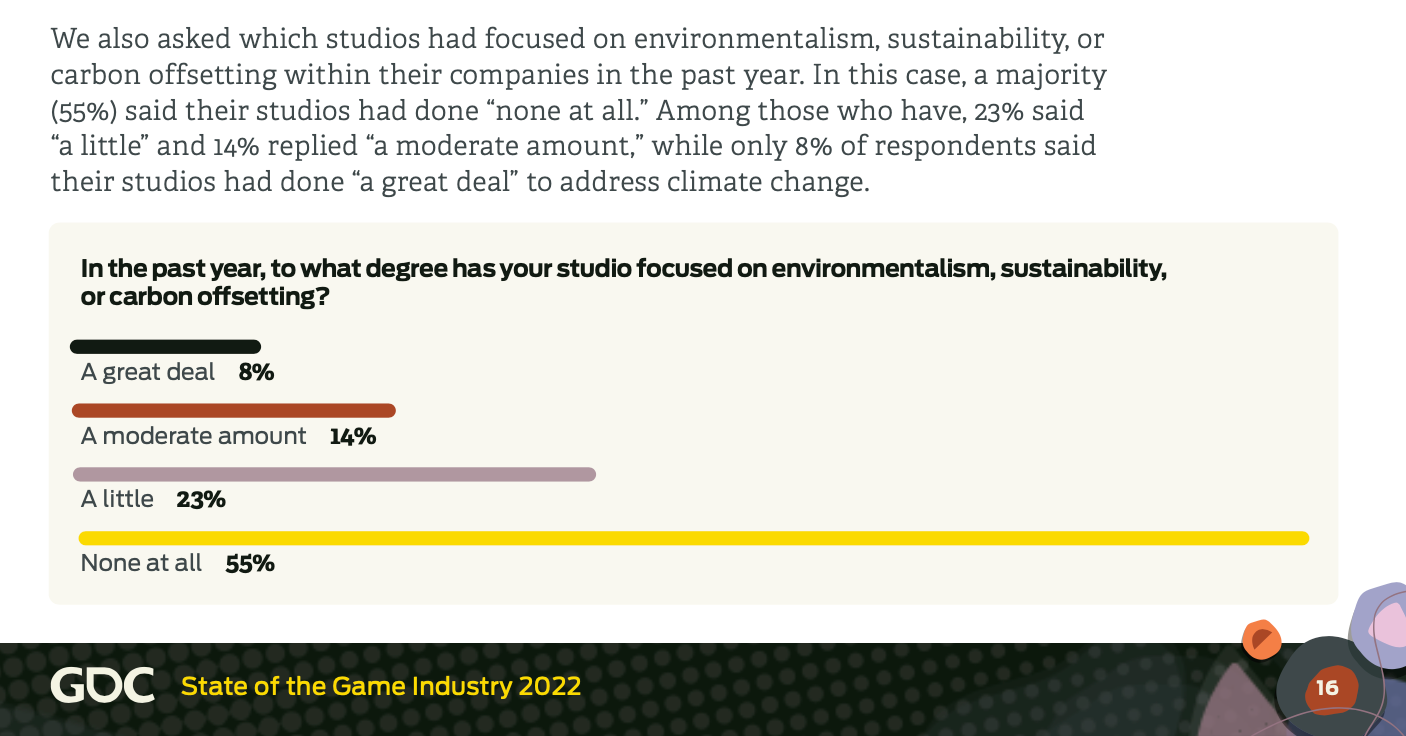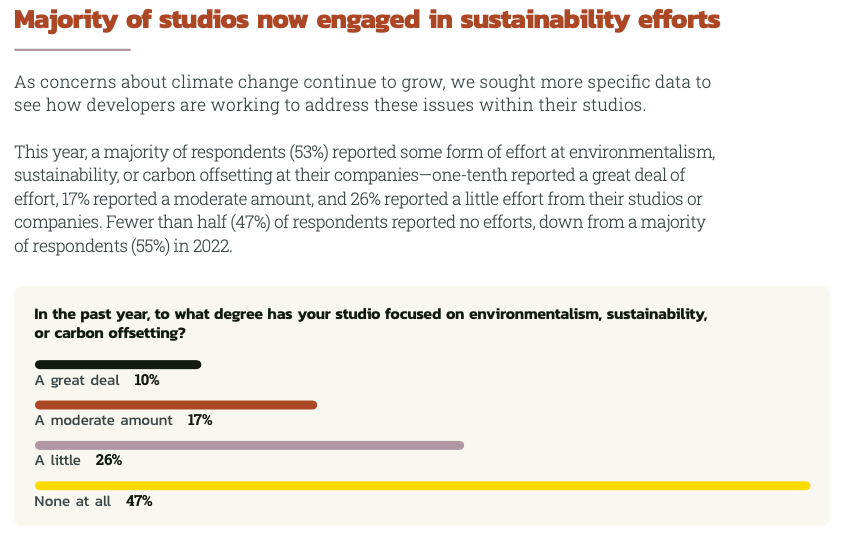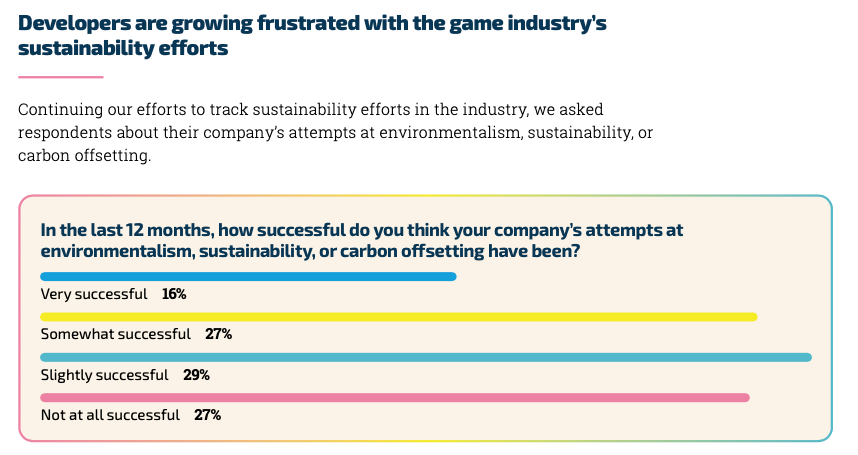GDC’s State of the Industry survey on sustainability in 2024

For the past three years, GDC’s annual survey of attendees – the somewhat ambitiously named “State of the Industry” survey – has asked at least one question about sustainability. Let’s look at the evolution of both the questions themselves and the responses, and see what it can tell us about the state of things in 2024.
The first time it asked about sustainability was at the end of 2021, appearing in the 2022 State of the Industry report. At that point, 55% of respondents said their workplace had focussed on “environmentalism, sustainability, or carbon offsetting” in absolutely no way whatsoever over the past year. Not a great start!

The framing of that question as about “environmentalism, sustainability or carbon offsetting” is also telling – it sets an extraordinarily low bar and even then it was not being cleared! The inclusion of “carbon offsetting” as a default option is also illustrative of the widely held view that we can spend or offset our way out of the climate crisis – understandable, if deeply questionable.
In 2022 (reported in the 2023 report), the same question is posed though the splits have changed – if only slightly. The “no action whatsoever” figure was down to 47% (a reduction of just 8%) which honestly is probably partly because game companies were being increasingly vocal about their ESG and sustainability strategy, both internally and externally. In my opinion, I do not think this change represented a real, shift in industry strategy. Framing it as "a majority" seems a bit much, tbh.

That same year, the survey also asked for developers’ views on the level of success of their workplace’s sustainability/enviro/offsets efforts. This is an increasingly interesting question. I don’t think a majority of developers are all that well placed to evaluate the success of their workplace’s policies, so what I interpret it as is something like an indication of the level of faith in game industry leadership and their climate policies.
Unfortunately, we didn’t get a chart of responses but here’s the relevant paragraph:

So in 2022, 90% of developers had some kind of faith in their workplace’s policies delivering something positive. Almost 20% thinking they were “very or extremely” successful is interesting as well – and I wonder what that extreme success they had in mind looked like. Perhaps in 2022, most game developers were just glad to see some sort of action. Again, the bar is set pretty low.
2022 was also the first full year of data that we tallied up the GHG disclosures of the largest companies in the global games industry, presented in the AfterClimate 2023 Net Zero Snapshot. So while the feeling in 2022 was largely that something positive was being done, simultaneously the games industry was almost certainly emitting more than it ever had. Almost every single company represented in the 2023 snapshot grew its emissions (in 2022) after the 2-year dip from COVID-19 travel restrictions and WFH mandates. So a bit of a disconnect there between sentiment and reality… which probably should not surprise us.
Fast forward to this month and the latest State of the Industry is out, reflecting on the turbulent year of 2023. Unfortunately, we don’t get the same question about the number of studios engaged in environmentalism, sustainability, or carbon offsetting – instead, just a single question is asked about the “success” of those efforts. Does that mean that every studio is doing something now? Probably not.

I doubt the “none at all” response category (which was down to 47%) maps neatly onto the 27% “not at all successful” in the most recent survey. But what’s the change in each category of this question from the previous year? Here’s my side-by-side comparison:
In the last 12 months, how successful do you think your company’s attempts at environmentalism, sustainability, or carbon offsetting have been?
| 2022 | 2023 |
|---|---|
| Very or extremely successful (18%) | Very successful (16%) |
| Moderately successful (37%) | Somewhat successful (27%) |
| Slightly successful (35%) | Slightly successful (29%) |
| Not at all successful (10%) | Not at all successful (27%) |
So what happened between the end of 2022 and the end of 2023? Highly successful sustainability game strategy remained very successful (at least, as perceived by developers). Everything else besides, however, dropped in its perceived success.
How do we interpret this? Were the past 12 months a massive backslide in game industry sustainability? Is a massive change in direction and approach warranted? Keep in mind that the bar here is already quite low, as we’re inviting the broadest possible interpretation of sustainability, environmentalism and carbon offsetting. It’s possible – but I suspect two (tentative) conclusions fit the survey better.
Firstly, I suspect the base level of awareness of what sustainability means among game developers, and what counts as a successful sustainability strategy, has increased over the past 12 months. There are many reasons for this, from huge visible news stories that raised massive red flags about the validity of carbon offsetting and credits, to an increase in news stories specifically about the environmental impact of games and digital technology. It’s also the advocacy from the likes of the members of IGDA Climate SIG, Playing 4 The Planet, and this very newsletter (with its modest reach) – but it's also internal comms efforts raising the visibility of the issue, and more direct encounters with climate programs inside games businesses. Global climate activism is not going away, either, and so while we might quibble over strategies like blocking freeways and inconveniencing commuters, the visibility and frequency have never been greater.
The second tentative explanation that fits, I think, is that the level of faith in game industry leadership and corporate climate strategy was shaken in 2023 by wave after wave after wave of layoffs, and other economic cuts & contractions. The first things to go when a business is stressed financially are those that are seen as optional – such as spending on carbon offsets, sustainability initiatives, and so on. If it does reflect a loss of faith in strategy (rather than the actual failure of strategy) we might want to approach the year ahead a bit differently, and not abandon efforts that haven't quite begun to deliver yet. Thinking about the 18% -> 16% "very successful" that was the most stable result over the past 12 months might align with this as well?
This is not to say that everyone should stick with carbon credits and whatever sustainability strategy was decided already way back in 2022. However it points to the need for a different method of evaluation.
One of the themes that come up in the open response questions (which asks, “What do you think is working about you companies…efforts?”) touches on the effectiveness of certain policies, but also expresses “feelings of disillusionment, frustration, and helplessness when it comes to making a positive impact on the environment—especially related to the issue of personal versus collective responsibility.” One response that resonated with me said that “We do some carbon offsetting, but that feels like a Band-Aid on a bleeding wound. Not much is being done, or not that I know of, to address deeper issues”.
Is the games industry set up or equipped to adequately respond to these problems, ones that are collective in nature? Is it sufficient to have individual companies, small teams working within huge companies, often siloed away from other sustainability leaders in the industry? Is the hierarchical business structure of the 20th century sufficient for the century we are now in? For the physical climate that we are now rapidly entering? I strongly suspect not. We are going to need to find – or more likely make – new ways of working together to solve sustainability problems.
I have some ideas, and I know a few others that do to. More soon.